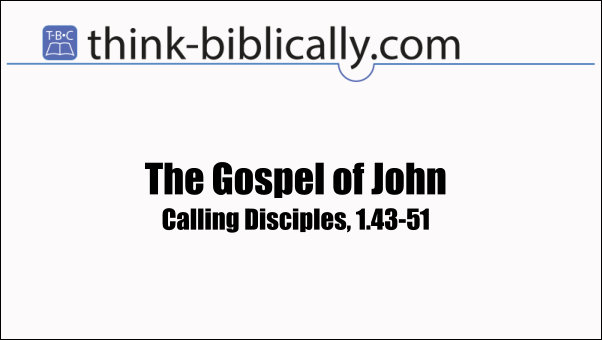By Tyson Thorne

Yesterday we left off on day three from the perspective of John the Baptist. In verse 43 we come to day four and we leave the Baptizer behind. Jesus has three disciples already, Andrew, Peter and another. On this day Jesus calls a few more. Phillip was from the same town as Andrew and Peter, and Jesus called him with two simple words: "Follow me." From Phillip Jesus gained Nathaniel, and how he convinces Nathanael (also probably known as Bartholomew) to come along is with an argument that aligns with the author's purpose. He testifies that Jesus is the long awaited Messiah.
"Jesus, the son of Joseph, is the one whom Moses and the prophets wrote about" (emphasis mine). This isn't the first time that we have heard someone providing this kind of evangelical argument. Near the end of Luke's Gospel is an account where Jesus, disguised somehow so as not to be recognized, is conversing with the disciples on a road to Emmaus. Luke writes: "Then beginning with Moses and all the prophets, he interpreted to them the things written about himself in all the scriptures." What is this argument?
John's Gospel is altogether different from the others. While Matthew, Mark and Luke all borrowed heavily from each other, John is unique. So how is that John contains the same phrase that Luke does? Because this phrase was a common Jewish one. "Moses and all the prophets" was used to reference the entirety of the Hebrew Bible, what we call the Old Testament. Christianity wasn't birthed a new religion, a competitor to Judaism. Christianity is a part of the faith of Abraham, Isaac and Jacob, of David and many others. Jesus is the one foretold.
Where does the Old Testament talk about Jesus?
Details of the birth of the Messiah are scattered throughout the Old Testament. We are told that he would be born in Bethlehem (Micah 5:2) of a virgin (Isaiah 7:14) as a descendant of Abraham (Genesis 12:1-3), of the tribe of Judah (Genesis 49:10), and of the house of David (2 Samuel 7:12-16). It was predicted that a great slaughter of Jewish children would follow (Jeremiah 31:15) but that the Messiah would escape to Egypt (Hosea 11:1). All these prophecies have already been fulfilled in the life of Yeshua (Jesus) in the following New Testament passages (many of which are also confirmed by the first century historian Josephus): Matthew 2:1; Matthew 1:21-23; Matthew 1:1 and Galatians 3:16; Luke 3:23, 33 and Hebrews 7:14; Matthew 1:1; Matthew 2:16-18; Matthew 2:14-15. It is no surprise that Matthew includes these details as he was writing to a Jewish audience who would understand their significance.
Details surrounding the Messiah’s ministry are also foretold in Old Testament books. We are told that the Messiah would be announced and identified by a contemporary prophet (Isaiah 40:3-5 and Malachi 3:1) and would be anointed not by the traditional holy oil but by the Spirit of God (Isaiah 11:2). His message would be one of good news (Isaiah 61:1), that he would perform miracles (Isaiah 35:5-6) and cleanse the temple (Malachi 3:1). The location of his ministry is foretold as Galilee (Isaiah 9:1) and that though he would be rejected largely by his people (Psalm 118:22) he would enter the city of Jerusalem as a king (Zechariah 9:9) exactly 173,880 days from the decree to rebuild Jerusalem (Daniel 9:25) a time frame that puts the coming of the Messiah in the early part of the first century AD. Once more we see these prophecies align with the person of Jesus in the following New Testament passages: Matthew 3:1-3; Matthew 3:16-17; Luke 4:14-21; Matthew 9:35; Matthew 21:12-13; Matthew 4:12-16; Matthew 21:4-9; 1 Peter 2:7; 1 Peter 2:7; Matthew 21:4-11). These 16 fulfilled prophecies about the Messiah are only the beginning.
Whichever prophecies about the Messiah Phillip referred to it must have convinced Nathanael, for he went to see Jesus himself despite the fact that this Rabbi came from the wrong side of the tracks. As he approached Jesus shouted to the others, "Look, a true Israelite in whom is found no deceit!" A strange greeting to be sure. Jesus is making reference to Psalm 32.2 wherein David writes how it is better to acknowledge and confess one's sins. While it's meaning is unclear to us, it was clear to Nathanael for it prompted him to ask, "how do you know me?" It would be like someone greeting you with your favorite Bible verse. Jesus tells him, "I saw you while you were under the fig tree". It may be that Nathanael had been reading from Psalm 32 while enjoying the shade of that fig tree, which was a popular place to meditate on scripture. All we can do is speculate and note that it was enough to convince Nathanael that he was the Messiah. Interestingly, his response to Jesus also makes reference to a Psalm, the second, which uses the name "Son of God."
Jesus tells him, "You will see greater things than these" and, indeed, they will.
